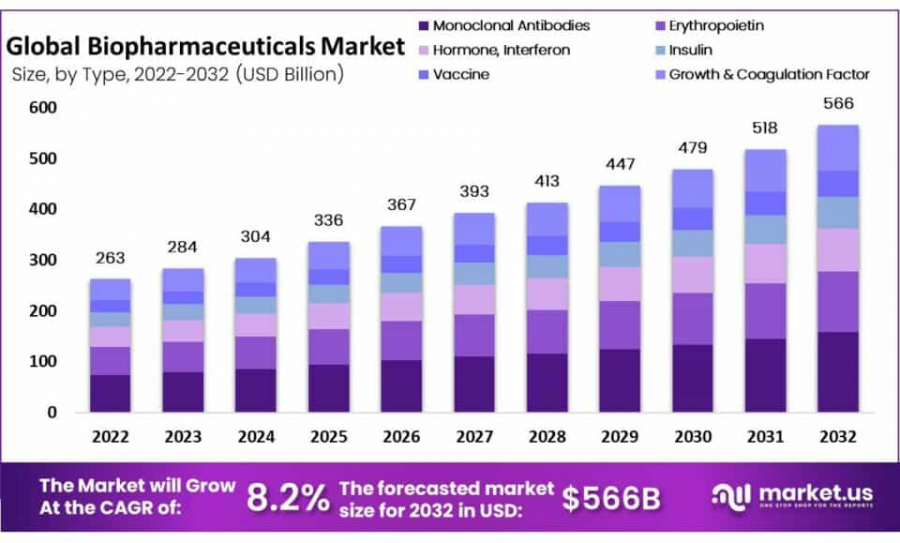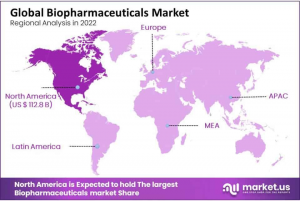
Biopharmaceuticals Market to Hit US$ 566 Billion by 2032, Growing at 8.2% CAGR
Biopharmaceuticals Market is expected to grow at a CAGR of 8.2% over the next 10 years and will reach USD 566 Bn in 2032.
NEW YORK, NY, UNITED STATES, January 24, 2025 /EINPresswire.com/ -- The Global Biopharmaceuticals Market is poised for substantial growth, projected to increase from USD 263 billion in 2022 to USD 566 billion by 2032, achieving a compound annual growth rate (CAGR) of 8.2%. This surge is primarily driven by continuous advancements in biotechnology and stringent regulatory measures ensuring the quality and efficacy of biotherapeutic products, including vaccines, growth factors, and monoclonal antibodies. These products, cultivated from living cells, necessitate rigorous consistency checks and testing across production cycles to meet global health standards.
Technological innovations, particularly the adoption of recombinant DNA technology, play a pivotal role in enhancing the production of biotherapeutics. This technology facilitates the manufacturing of highly purified biological materials, which have expanded the treatment possibilities for numerous previously untreatable conditions. The integration of advanced biotechnologies is crucial for the sector’s growth, enabling the development of sophisticated treatments that can reach more patients globally.
Regulatory oversight, led by entities such as the World Health Organization (WHO), also significantly influences market growth. WHO’s international reference standards and guidelines ensure uniformity and comparability of biological products across various manufacturers and countries. This regulatory framework is essential for maintaining high-quality standards and supporting widespread access to these vital medicines. Additionally, the sector is moving towards sustainable practices, with WHO advocating for reduced environmental impacts of pharmaceutical manufacturing, which includes setting standards for sustainable production and promoting eco-friendly innovations.
The global health impact of biologicals, especially vaccines, is profound, with an estimated annual prevention of 2-3 million deaths. Ongoing enhancements in vaccine efficacy, quality, and safety are critical for managing and reducing the prevalence of transmissible diseases worldwide. This ongoing development supports the sector’s growth by addressing global health challenges and expanding the reach of effective biological therapies. Overall, the biopharmaceutical sector is set to expand dynamically, fueled by technological advancements, stringent regulations, a focus on sustainability, and its significant contributions to public health.
Get Sample PDF Report: https://market.us/report/biopharmaceuticals-market/request-sample/
Key Takeaway
• By 2032, the global biopharmaceuticals market is anticipated to hit USD 566 billion, reflecting robust growth.
• The market's growth rate from 2023 to 2032 is projected at 8.2% annually.
• In 2022, the market’s value was reported at USD 263 billion.
• Monoclonal antibodies are expected to lead the market throughout the forecast period from 2023 to 2032.
• The oncology segment secured the largest market share in 2022.
• Europe contributed to 23% of the market’s revenue in 2022.
• North America was the leading market in 2022, holding a 43% revenue share, spurred by government and healthcare investments.
• The Asia Pacific region is poised for significant growth, driven by a large population base and healthcare initiatives by governments.
• Market growth is fueled by the rising prevalence of chronic diseases and strategic alliances among biopharmaceutical companies.
• Additional growth factors include an aging global population, the lingering impact of COVID-19, and increased research funding.
• Monoclonal antibodies, which are synthetically produced proteins, are utilized in treating various ailments, including COVID-19.
• Key market leaders include renowned firms such as Novo Nordisk, Johnson & Johnson, and Eli Lilly & Company.
Segmentation Analysis
Monoclonal Antibodies Lead in Biopharmaceuticals Market: In the global biopharmaceuticals market, the segments include erythropoietin, growth & coagulation factors, hormones, interferon, insulin, vaccines, and monoclonal antibodies, with the latter holding the largest market share. Monoclonal antibodies have gained prominence due to their high success rates in treating chronic diseases such as cancer, multiple sclerosis, cardiovascular disorders, and rheumatoid arthritis. Their ability to target diseased cells without harming healthy ones reduces toxicity and side effects, enhancing patient outcomes.
Vaccines Poised for Growth: The vaccine segment is set to experience significant growth during the forecast period. This surge is attributed to an increase in global disease prevalence and substantial investments by vaccine developers. As public and private sectors boost funding for vaccine development, this segment is expected to become increasingly lucrative, responding to the urgent need for effective immunizations against emerging health threats.
Oncology Dominates Application Segment: Within the biopharmaceuticals market, oncology remains the dominant application segment. Biopharmaceuticals are extensively utilized in treating various cancers, including lung, prostate, breast, and colorectal cancers. The escalating global incidence of cancer drives the demand for innovative and effective therapeutic options, solidifying oncology's position at the forefront of biopharmaceutical applications.
Cardiovascular Disease Segment to Witness Strong Growth: Looking ahead, the cardiovascular disease segment presents promising growth opportunities. The rising prevalence of cardiovascular diseases (CVDs) globally, coupled with increased efforts by biopharmaceutical companies to develop novel treatments, is propelling this segment. Investments are being channeled into the research and development of new drugs, aiming to address the urgent need for advanced cardiovascular therapies.
By Type
• Erythropoietin
• Growth & Coagulation Factor
• Hormone, Interferon
• Insulin
• Vaccine
• Monoclonal Antibodies
• Others Types
By Application
• Oncology
• Neurological Disease
• Metabolic Disease
• Infectious Disease
• Immunology
• Cardiovascular Disease
• Blood Disorder
• Others Applications
Regional Analysis
North America holds a leading position in the global biopharmaceuticals market, primarily driven by substantial investments from market participants and supportive government initiatives, particularly in the United States. The region's dominance is further reinforced by U.S. intellectual property rights, which cover a significant portion of newly developed innovative drugs. This strategic protection helps sustain North America's market leadership.
Additionally, the rise in healthcare costs and increased awareness of biopharmaceuticals contribute to the region's market strength. The prevalence of various chronic diseases in North America also plays a critical role. Together, these factors ensure continued growth and market dominance in the biopharmaceutical sector.
Meanwhile, the Asia Pacific region is poised to become a significant market during the forecast period. With three-fifths of the world's population, this region offers a substantial market opportunity. Factors such as increasing healthcare expenditure, government initiatives to build advanced healthcare infrastructure, and the growing prevalence of chronic diseases are expected to drive market growth in Asia Pacific.
The region's growth is also bolstered by the presence of leading Contract Manufacturing Organizations (CMOs). These organizations are crucial for the expansion of the biopharmaceutical industry in Asia Pacific. Their strategic location within the region significantly influences the overall market development, making Asia Pacific a key area of opportunity for future market expansion.
Buy Directly: https://market.us/purchase-report/?report_id=21607
Key Players Analysis in the Biopharmaceuticals Market
The biopharmaceuticals market is highly fragmented, marked by the presence of several local and regional competitors. However, the market is predominantly influenced by a number of global players known for their strong brand recognition and extensive distribution networks. Here’s an analysis of the key market players:
• Novo Nordisk A/S: Specializes in diabetes care and other serious chronic conditions. Known for innovative insulin and hormone replacement therapies.
• AbbVie Inc.: Focuses on immunology, oncology, and virology. Notable for its blockbuster drug, Humira, and a strong pipeline in oncology.
• Eli Lilly and Company: Prominent in diabetes, cancer, and autoimmune diseases, with a significant investment in research and development to fuel innovation.
• Amgen Inc.: A leader in biotechnology, known for its oncology and cardiovascular portfolios. Continuously expanding through strategic acquisitions and partnerships.
• Abbott: While broader in healthcare products, its biopharmaceutical segment focuses on nutritional health and diagnostics, with steady growth in emerging markets.
• Bayer AG: Operates across various therapeutic areas including cardiovascular, oncology, and women’s healthcare, with a strong emphasis on innovation and sustainability in healthcare solutions.
• Biogen: Primarily known for its multiple sclerosis and neurodegenerative disease treatments. Invests heavily in advanced therapies for serious neurological diseases.
• Bristol-Myers Squibb Company: Focuses on cancer, HIV/AIDS, and cardiovascular diseases. Noteworthy for its extensive research in immuno-oncology.
• Hoffmann-La Roche Ltd.: A giant in personalized medicine, strong in oncology and diagnostics, known for its innovative approaches in research and drug development.
• Johnson & Johnson: Offers a broad array of biopharmaceutical products, particularly strong in immunology and infectious diseases, and a leader in global healthcare.
• GlaxoSmithKline Plc: Engages in respiratory, vaccine, and HIV sectors. GSK is transitioning towards a more focused biopharma company, divesting from other segments.
• Merck & Co., Inc.: Known for its strong presence in oncology, vaccines, and animal health. It continues to expand its reach with key partnerships and groundbreaking therapies.
• Pfizer Inc.: Leads with a strong portfolio in vaccines, oncology, and cardiovascular health. Notable for its rapid development of the COVID-19 vaccine and continuous innovation.
• Sanofi: Focuses on immunology, oncology, and rare diseases, with a commitment to developing high-impact biopharmaceuticals.
To maintain competitiveness in this dynamic market, these companies engage in strategic expansions through partnerships, investments, and frequent product launches, aiming to capitalize on and cater to the diverse needs of the global healthcare landscape. Each player's strategy not only enhances their market position but also contributes significantly to the overall growth and technological advancements in the biopharmaceuticals sector.
*We offer customized market research reports tailored to meet your specific business needs and requirements.
Lawrence John
Prudour
+91 91308 55334
Lawrence@prudour.com
Visit us on social media:
Facebook
LinkedIn
Distribution channels: Healthcare & Pharmaceuticals Industry
Legal Disclaimer:
EIN Presswire provides this news content "as is" without warranty of any kind. We do not accept any responsibility or liability for the accuracy, content, images, videos, licenses, completeness, legality, or reliability of the information contained in this article. If you have any complaints or copyright issues related to this article, kindly contact the author above.
Submit your press release


